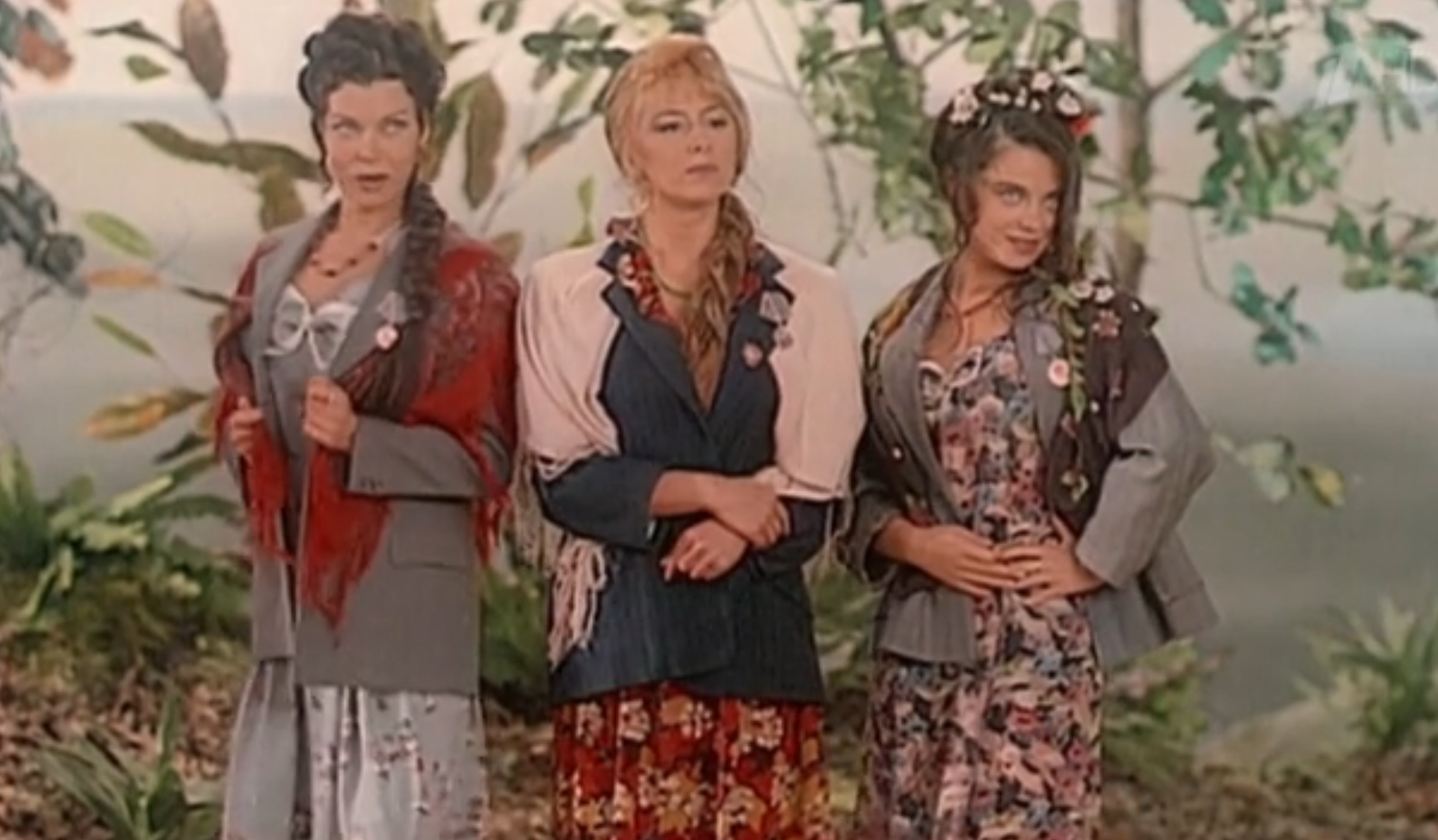Filed Under: Video > Entertainment > Soviet Nostalgia: “Old Songs About What Matters Most”
Soviet Nostalgia: “Old Songs About What Matters Most”

On 31 December 1995, the TV channel ORT aired a New Year’s Eve special in which contemporary post-Soviet actors performed popular Soviet-era songs while, at the same time, acting out a day in the life on a perpetually singing, well-to-do collective farm from the late Stalin period (the set was in fact modeled on the 1950 film Cossacks of the Kuban). What motivated this foray into Stalin-era nostalgia? One consideration is the broadcast’s timing: it appeared on the cusp of 1996, when the Communist Party of the Russian Federation (KPRF) was in ascendance and its leader, Gennady Zyuganov (1944-), seemed likely to win the presidency in the upcoming election. This neo-Communist/Stalinist interpretation is especially persuasive given that, of the 18 songs performed, at least eight were drawn from Stalin-era films, including two from Cossacks—a work that Stalin’s eventual successor, Nikita Khrushchev (1894-1971), had explicitly denounced as the apogee of dishonest Stalinist filmmaking. Moreover, all but three of the songs are stylized folk tunes, and as such recall Soviet Communist Party rhetoric celebrating the “workers and peasants” supposedly in charge of the socialist state.
Contradicting this revanchist interpretation of Old Songs is the project’s thoroughly ironic presentation. It was produced and written by Leonid Parfenov (1960-) and Konstantin Ernst (1961-)—two men who, in the 1990s, epitomized the postmodern aesthetics of the Russian political liberal. As one of Russia’s foremost popular documentary filmmakers, Parfenov in particular had long been fascinated by memory work and often experimented with playful appropriations of past images and styles. That playfulness dictated the choice of pop-star guests in his 1995 TV special. Each featured guest, from Natasha Korolyova to Kristina Orbakaite, was a key player in a post-Soviet celebrity music industry that hyped up their capitalist-style glamor and sex appeal.
In Old Songs, viewers encountered these familiar figures in haphazard high-Soviet drag, which immediately created ironic distance from these “most important” old songs about love on collective farms and frontline service during the Second World War, known in Russia as the “Great Patriotic War.” The special’s ironic tone comes through in its stylistic features, from the narrator’s snarky tone to the sexy leather boots of the “collective farm girls” who sing the show’s first tune. These elements transform a genuine folk song, set on a collective farm, into an ambivalent display that precludes a seamless reunion with the Soviet past. The argument that Old Songs invites—does it stay at the level of ironic play, or does revanchism become the real meaning once the postmodern games are over?—epitomizes discussions among Russian cultural critics and public intellectuals in the 1990s.
Contradicting this revanchist interpretation of Old Songs is the project’s thoroughly ironic presentation. It was produced and written by Leonid Parfenov (1960-) and Konstantin Ernst (1961-)—two men who, in the 1990s, epitomized the postmodern aesthetics of the Russian political liberal. As one of Russia’s foremost popular documentary filmmakers, Parfenov in particular had long been fascinated by memory work and often experimented with playful appropriations of past images and styles. That playfulness dictated the choice of pop-star guests in his 1995 TV special. Each featured guest, from Natasha Korolyova to Kristina Orbakaite, was a key player in a post-Soviet celebrity music industry that hyped up their capitalist-style glamor and sex appeal.
In Old Songs, viewers encountered these familiar figures in haphazard high-Soviet drag, which immediately created ironic distance from these “most important” old songs about love on collective farms and frontline service during the Second World War, known in Russia as the “Great Patriotic War.” The special’s ironic tone comes through in its stylistic features, from the narrator’s snarky tone to the sexy leather boots of the “collective farm girls” who sing the show’s first tune. These elements transform a genuine folk song, set on a collective farm, into an ambivalent display that precludes a seamless reunion with the Soviet past. The argument that Old Songs invites—does it stay at the level of ironic play, or does revanchism become the real meaning once the postmodern games are over?—epitomizes discussions among Russian cultural critics and public intellectuals in the 1990s.